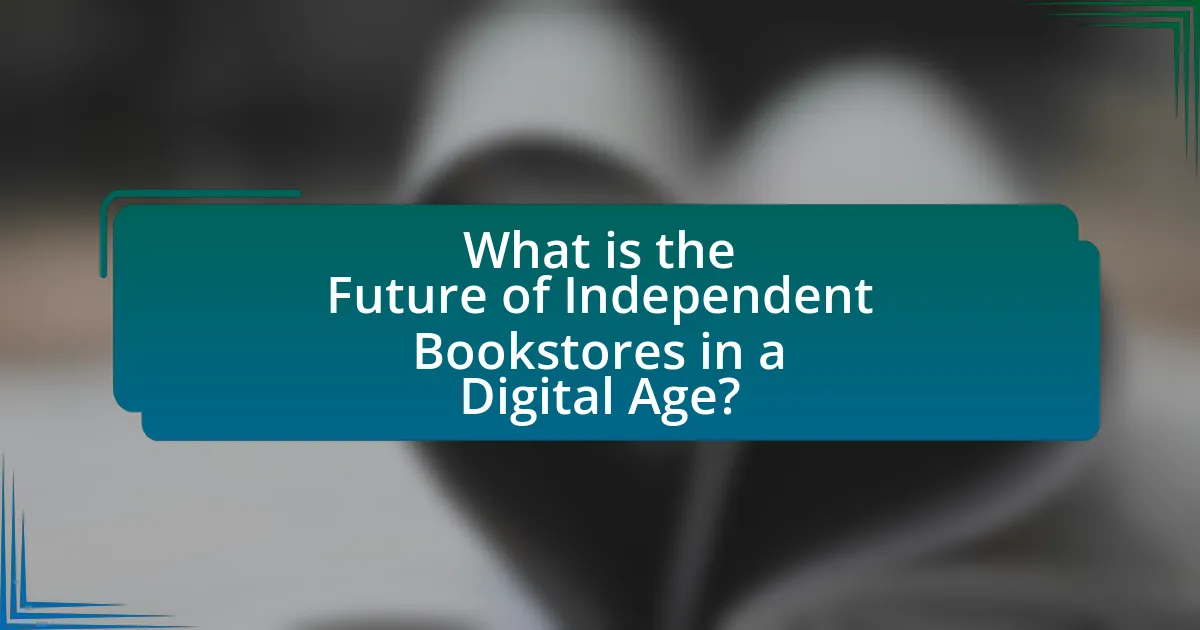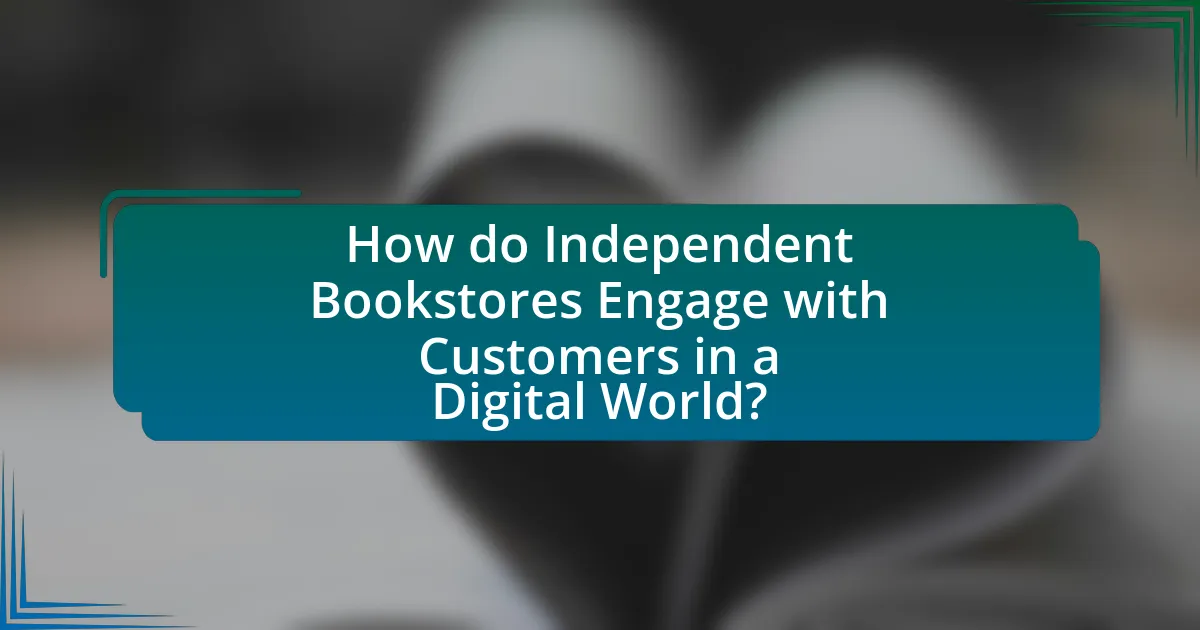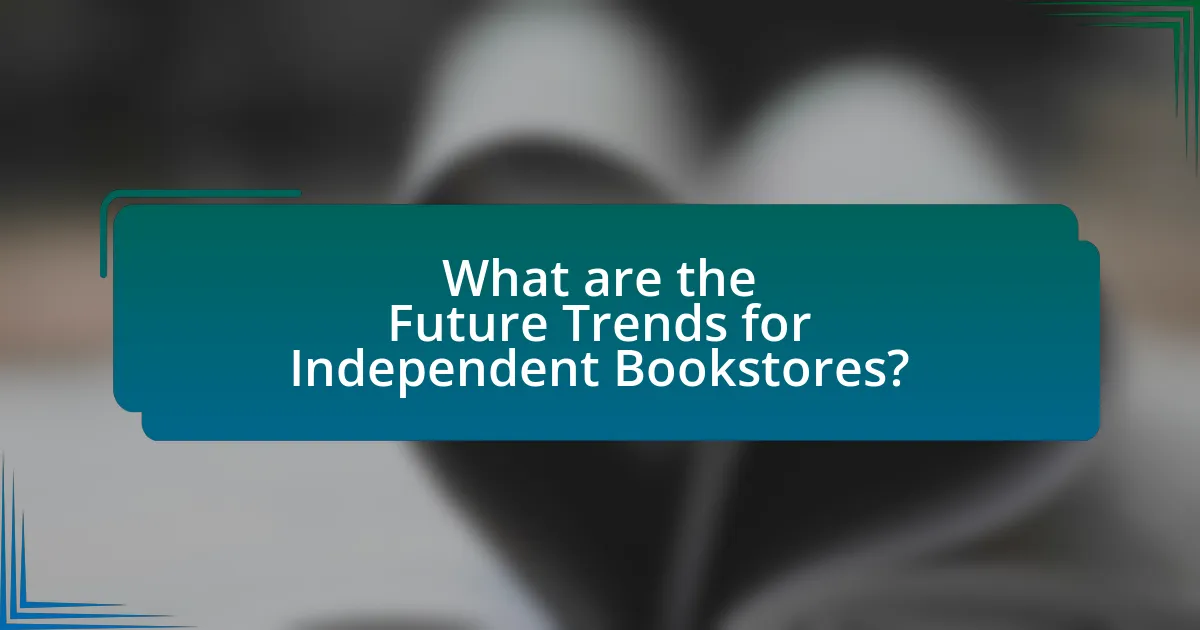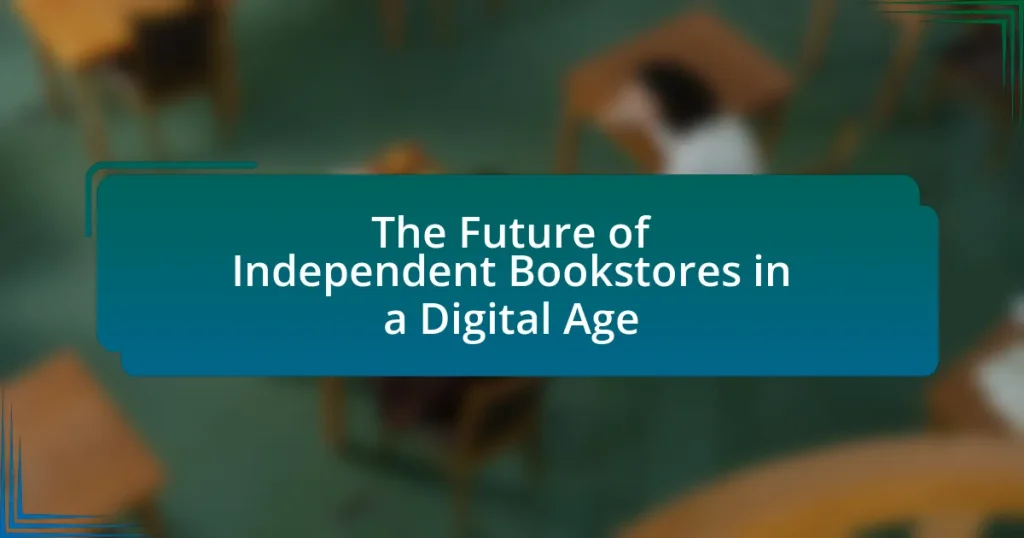The article examines the future of independent bookstores in the context of a digital age, highlighting their resilience and adaptability. It discusses how these bookstores are enhancing community engagement through personalized customer service, events, and unique shopping experiences, which differentiate them from online retailers. The piece also explores the technologies being embraced by independent bookstores, such as e-commerce platforms and social media, to improve customer outreach and sales. Additionally, it addresses the challenges posed by online competition and changing consumer habits, while emphasizing the importance of independent bookstores in supporting local economies and cultural engagement. Finally, the article outlines future trends and strategies for independent bookstores to thrive amidst digital transformation.

What is the Future of Independent Bookstores in a Digital Age?
The future of independent bookstores in a digital age is promising, as they adapt by enhancing community engagement and offering unique experiences. Independent bookstores are increasingly focusing on personalized customer service, hosting events, and creating spaces for community gatherings, which differentiates them from online retailers. According to a 2021 report by the American Booksellers Association, independent bookstores saw a 30% increase in sales during the pandemic, highlighting their resilience and ability to connect with local customers. This trend suggests that while digital sales continue to rise, independent bookstores can thrive by leveraging their unique strengths and fostering community relationships.
How are independent bookstores adapting to digital trends?
Independent bookstores are adapting to digital trends by enhancing their online presence and integrating e-commerce capabilities. Many independent bookstores have developed user-friendly websites that allow customers to browse and purchase books online, which is crucial as online sales have surged, accounting for over 20% of total book sales in recent years. Additionally, these bookstores are utilizing social media platforms to engage with their communities, promote events, and share recommendations, thereby fostering a loyal customer base. Some have also embraced digital tools like email newsletters and virtual events to maintain customer relationships and drive sales, reflecting a strategic shift to meet the demands of a digital-savvy consumer base.
What technologies are being embraced by independent bookstores?
Independent bookstores are embracing technologies such as e-commerce platforms, social media marketing, and inventory management systems. E-commerce platforms enable these bookstores to sell books online, expanding their reach beyond physical locations; for instance, many independent bookstores have adopted Shopify or WooCommerce to facilitate online sales. Social media marketing allows them to engage with customers and promote events, with platforms like Instagram and Facebook being particularly effective for showcasing new arrivals and community events. Additionally, inventory management systems help streamline operations, allowing bookstores to track sales and manage stock efficiently, which is crucial for maintaining profitability in a competitive market. These technologies collectively enhance customer experience and operational efficiency, ensuring that independent bookstores can thrive in the digital age.
How do independent bookstores leverage online sales platforms?
Independent bookstores leverage online sales platforms by creating user-friendly e-commerce websites and utilizing third-party marketplaces to reach a broader audience. These platforms enable them to showcase their inventory, allowing customers to browse and purchase books online, which is essential in a digital age where consumer preferences are shifting towards online shopping. For instance, many independent bookstores partner with platforms like Bookshop.org, which supports local bookstores by providing a commission on sales made through their site. This strategy not only increases visibility but also helps maintain customer loyalty by offering unique selections and personalized recommendations that larger retailers may not provide.
Why is the survival of independent bookstores important?
The survival of independent bookstores is important because they foster community engagement and support local economies. Independent bookstores often serve as cultural hubs, hosting events, author signings, and book clubs that encourage social interaction and literacy. According to a 2019 study by the American Booksellers Association, independent bookstores contribute significantly to local economies, with each bookstore generating an average of $1.3 million in revenue annually and creating jobs in the community. Furthermore, they provide diverse and curated selections of books that reflect local interests, which is often lacking in larger chain stores and online retailers. This unique offering helps to maintain the cultural fabric of communities, making their survival essential in a digital age dominated by online shopping.
What cultural impacts do independent bookstores have on communities?
Independent bookstores significantly enhance the cultural fabric of communities by fostering local engagement, promoting diverse voices, and serving as community hubs. These bookstores often host events such as author readings, book clubs, and workshops, which encourage social interaction and cultural exchange among residents. According to a study by the American Booksellers Association, independent bookstores contribute to local economies by keeping money within the community, with estimates suggesting that for every $100 spent at a local bookstore, approximately $68 remains in the community compared to $43 for chain stores. This economic retention supports local culture and arts initiatives, further enriching the community’s cultural landscape. Additionally, independent bookstores frequently curate selections that reflect the unique interests and demographics of their neighborhoods, thereby promoting underrepresented authors and fostering a sense of identity and belonging among residents.
How do independent bookstores contribute to local economies?
Independent bookstores contribute to local economies by generating revenue, creating jobs, and fostering community engagement. These establishments often source their inventory from local authors and publishers, which keeps money circulating within the community. According to a study by the American Booksellers Association, independent bookstores contribute approximately $7.1 billion to the U.S. economy annually. Additionally, they employ around 30,000 people, providing stable jobs that support local families. Furthermore, independent bookstores often serve as community hubs, hosting events that attract visitors and stimulate local spending in surrounding businesses.
What challenges do independent bookstores face in a digital age?
Independent bookstores face significant challenges in a digital age, primarily due to competition from online retailers and the shift in consumer purchasing habits. The rise of e-commerce giants like Amazon has led to price undercutting, making it difficult for independent stores to compete on price. Additionally, the increasing popularity of e-books and digital reading platforms has reduced the demand for physical books, further impacting sales. According to a 2021 report by the American Booksellers Association, independent bookstores have seen a decline in foot traffic as consumers increasingly turn to online shopping for convenience. These factors collectively threaten the viability of independent bookstores, necessitating innovative strategies to attract customers and adapt to changing market dynamics.
How does competition from online retailers affect independent bookstores?
Competition from online retailers significantly impacts independent bookstores by reducing their customer base and sales. Online retailers often offer lower prices, vast selections, and convenience, which attract consumers away from local bookstores. According to a 2019 report by the American Booksellers Association, independent bookstores have seen a decline in sales due to the rise of e-commerce giants, with many reporting that online competition has made it challenging to maintain profitability. This shift in consumer behavior has led to a decrease in foot traffic and, consequently, a struggle for many independent bookstores to survive in an increasingly digital marketplace.
What are the financial challenges for independent bookstores today?
Independent bookstores today face significant financial challenges, primarily due to competition from online retailers, rising operational costs, and changing consumer behavior. The dominance of e-commerce giants like Amazon has led to a substantial decline in foot traffic and sales for independent stores, as consumers increasingly prefer the convenience and often lower prices offered online. Additionally, operational costs, including rent, utilities, and labor, have risen, putting further strain on profit margins. According to a 2021 report by the American Booksellers Association, independent bookstores reported an average profit margin of only 2.5%, highlighting the precarious financial situation many face. Furthermore, the shift towards digital media consumption has reduced demand for physical books, exacerbating the financial difficulties for these businesses.

How do Independent Bookstores Engage with Customers in a Digital World?
Independent bookstores engage with customers in a digital world by leveraging online platforms for marketing, community building, and sales. They utilize social media to create interactive content, promote events, and foster a sense of community among readers. For instance, many independent bookstores host virtual book clubs and author events, allowing customers to participate regardless of location. Additionally, they often maintain user-friendly websites that facilitate online ordering and provide personalized recommendations based on customer preferences. According to a 2021 survey by the American Booksellers Association, 70% of independent bookstores reported increased online sales during the pandemic, highlighting their adaptability in a digital landscape.
What strategies are effective for customer engagement?
Effective strategies for customer engagement in independent bookstores include personalized recommendations, community events, and leveraging social media. Personalized recommendations enhance the shopping experience by catering to individual customer preferences, which can increase customer loyalty and sales. Community events, such as author readings and book clubs, foster a sense of belonging and encourage repeat visits, as evidenced by a study from the American Booksellers Association showing that bookstores hosting events see a 30% increase in foot traffic. Additionally, utilizing social media platforms to interact with customers and promote new releases can significantly boost engagement, as 70% of consumers report that they are more likely to purchase from brands they follow on social media.
How do independent bookstores utilize social media for outreach?
Independent bookstores utilize social media for outreach by engaging with their communities, promoting events, and showcasing new titles. They create content that resonates with local audiences, such as book recommendations, author interviews, and behind-the-scenes looks at store operations. For instance, a survey by the American Booksellers Association found that 80% of independent bookstores use social media to promote events, which helps drive foot traffic and build customer loyalty. Additionally, platforms like Instagram and Facebook allow these bookstores to visually showcase their inventory and create a sense of community, fostering connections with readers and encouraging discussions around literature.
What role do events and community activities play in customer engagement?
Events and community activities significantly enhance customer engagement by fostering personal connections and creating memorable experiences. Independent bookstores that host author readings, book clubs, and community workshops encourage customers to interact with each other and the store, leading to increased loyalty and repeat visits. According to a study by the American Booksellers Association, 70% of customers reported that attending events made them more likely to return to the bookstore. This demonstrates that such activities not only attract foot traffic but also build a sense of community, which is essential for customer retention in a digital age where online shopping dominates.
How can independent bookstores create a unique shopping experience?
Independent bookstores can create a unique shopping experience by curating personalized selections of books that reflect the local community’s interests and values. This approach fosters a sense of connection between the store and its customers, as seen in studies indicating that 70% of consumers prefer shopping at local businesses that offer tailored products. Additionally, hosting community events, such as author readings and book clubs, enhances customer engagement and builds a loyal customer base. Research shows that bookstores that actively involve their community see a 30% increase in foot traffic compared to those that do not. By combining personalized curation with community involvement, independent bookstores can effectively differentiate themselves in the digital age.
What elements contribute to a memorable in-store experience?
A memorable in-store experience is primarily influenced by engaging customer service, a well-curated product selection, and an inviting atmosphere. Engaging customer service fosters personal connections, as studies show that 70% of consumers cite good customer service as a reason for loyalty. A well-curated product selection, tailored to the interests of the local community, enhances relevance and encourages exploration. Additionally, an inviting atmosphere, characterized by comfortable seating, appealing decor, and ambient music, creates a welcoming environment that encourages customers to linger. These elements collectively enhance customer satisfaction and drive repeat visits, which are crucial for the success of independent bookstores in a digital age.
How do independent bookstores curate their book selections to attract customers?
Independent bookstores curate their book selections by focusing on community preferences, local authors, and niche genres to attract customers. These stores often engage with their local communities through events, book clubs, and personalized recommendations, which helps them understand the specific tastes and interests of their clientele. Additionally, many independent bookstores prioritize stocking works by local authors and unique titles that may not be available in larger chain stores, thereby creating a distinctive shopping experience. This strategy not only fosters a sense of community but also encourages customer loyalty, as shoppers appreciate the curated selections that reflect their local culture and interests.

What are the Future Trends for Independent Bookstores?
Future trends for independent bookstores include a focus on community engagement, diversification of product offerings, and enhanced online presence. Independent bookstores are increasingly becoming community hubs, hosting events and fostering local author collaborations to strengthen customer loyalty. Additionally, many are expanding their inventory to include not just books but also gifts, stationery, and local artisan products, which can increase revenue streams. The rise of e-commerce has prompted these bookstores to develop robust online platforms, allowing them to reach a broader audience and compete with larger retailers. According to the American Booksellers Association, independent bookstores have seen a resurgence, with a reported 40% increase in the number of independent bookstores from 2009 to 2019, indicating a positive trend in their adaptation to changing market dynamics.
How is the role of independent bookstores evolving?
The role of independent bookstores is evolving to become community hubs that offer personalized experiences and curated selections. As consumers increasingly seek unique and local shopping experiences, independent bookstores are adapting by hosting events, book clubs, and author signings, which foster community engagement. According to a 2021 report by the American Booksellers Association, independent bookstores saw a 30% increase in sales during the pandemic, highlighting their resilience and the growing consumer preference for supporting local businesses. This shift indicates that independent bookstores are not only surviving but thriving by redefining their roles in the digital age.
What new business models are emerging for independent bookstores?
New business models emerging for independent bookstores include subscription services, community-focused events, and online sales platforms. Subscription services allow customers to receive curated book selections regularly, fostering customer loyalty and consistent revenue. Community-focused events, such as author readings and workshops, enhance local engagement and create additional revenue streams. Online sales platforms enable bookstores to reach a broader audience, capitalizing on the growing trend of e-commerce, which saw a 44% increase in online book sales in 2020 alone. These models reflect a shift towards integrating digital strategies while maintaining a strong community presence.
How are independent bookstores collaborating with other local businesses?
Independent bookstores are collaborating with local businesses through joint events, cross-promotions, and shared spaces. For instance, many independent bookstores host book readings or signings in partnership with local cafes or restaurants, creating a community atmosphere that attracts customers to both venues. Additionally, bookstores often collaborate with local artisans or craftspeople to feature their products, enhancing the shopping experience and supporting the local economy. This collaboration not only increases foot traffic but also fosters a sense of community, which is essential for the survival of independent bookstores in a digital age.
What innovations are shaping the future of independent bookstores?
Innovations shaping the future of independent bookstores include the integration of e-commerce platforms, community engagement initiatives, and enhanced customer experience through technology. E-commerce platforms enable independent bookstores to reach a broader audience, allowing them to sell books online and compete with larger retailers. Community engagement initiatives, such as hosting local events and author signings, foster a loyal customer base and strengthen community ties. Additionally, technology enhancements, like personalized recommendations and mobile apps, improve customer experience and streamline operations. These innovations are essential for independent bookstores to thrive in a competitive digital landscape.
How can technology enhance the customer experience in bookstores?
Technology can enhance the customer experience in bookstores by providing personalized recommendations and streamlining the purchasing process. For instance, using data analytics, bookstores can analyze customer preferences and purchase history to suggest books tailored to individual tastes, thereby increasing customer satisfaction and engagement. Additionally, mobile apps can facilitate easy browsing, in-store navigation, and seamless checkout experiences, reducing wait times and improving overall convenience. According to a study by the American Booksellers Association, bookstores that implemented technology-driven solutions saw a 20% increase in customer retention rates, demonstrating the effectiveness of these enhancements in fostering loyalty and improving the shopping experience.
What are the potential impacts of e-books and audiobooks on independent bookstores?
E-books and audiobooks significantly impact independent bookstores by reducing physical book sales and altering consumer purchasing habits. The rise of digital formats has led to a decline in foot traffic, as consumers increasingly opt for the convenience of instant access to titles online. According to a 2021 report by the American Booksellers Association, independent bookstores experienced a 20% decrease in sales attributed to the growing popularity of e-books and audiobooks. Additionally, the competitive pricing of digital formats often undercuts the prices of physical books, making it challenging for independent retailers to maintain profitability. This shift in consumer behavior necessitates that independent bookstores adapt by diversifying their offerings, such as hosting events or providing unique in-store experiences, to attract customers despite the digital competition.
What practical steps can independent bookstores take to thrive?
Independent bookstores can thrive by diversifying their offerings and enhancing community engagement. By incorporating events such as author signings, book clubs, and workshops, bookstores can create a vibrant community hub that attracts customers. Research shows that independent bookstores that host events see a significant increase in foot traffic and sales, as these activities foster a sense of belonging and loyalty among customers. Additionally, leveraging online platforms for sales and marketing can expand their reach, allowing them to compete with larger retailers. A study by the American Booksellers Association found that independent bookstores that embrace e-commerce report higher overall sales, demonstrating the effectiveness of a hybrid approach in the digital age.
How can independent bookstores effectively market themselves in a digital age?
Independent bookstores can effectively market themselves in a digital age by leveraging social media platforms, creating engaging online content, and building strong community connections. Social media allows bookstores to reach a wider audience, promote events, and share book recommendations, which can increase customer engagement. For instance, according to a 2021 survey by the American Booksellers Association, 80% of independent bookstores reported using social media to connect with customers and promote their offerings. Additionally, creating a user-friendly website with an online store can facilitate sales and provide customers with easy access to inventory. Furthermore, hosting virtual events, such as author readings or book clubs, can attract new customers and foster a sense of community, which is crucial for independent bookstores in a competitive market.
What best practices should independent bookstores adopt for sustainability?
Independent bookstores should adopt practices such as sourcing eco-friendly materials, implementing energy-efficient systems, and promoting community engagement to enhance sustainability. Sourcing eco-friendly materials includes using recycled paper for packaging and offering sustainable products, which reduces environmental impact. Implementing energy-efficient systems, like LED lighting and energy-efficient heating and cooling, can significantly lower energy consumption and costs. Additionally, promoting community engagement through events and partnerships with local organizations fosters a culture of sustainability and encourages customers to support eco-friendly initiatives. These practices not only contribute to environmental sustainability but also resonate with consumers increasingly concerned about ecological issues.


